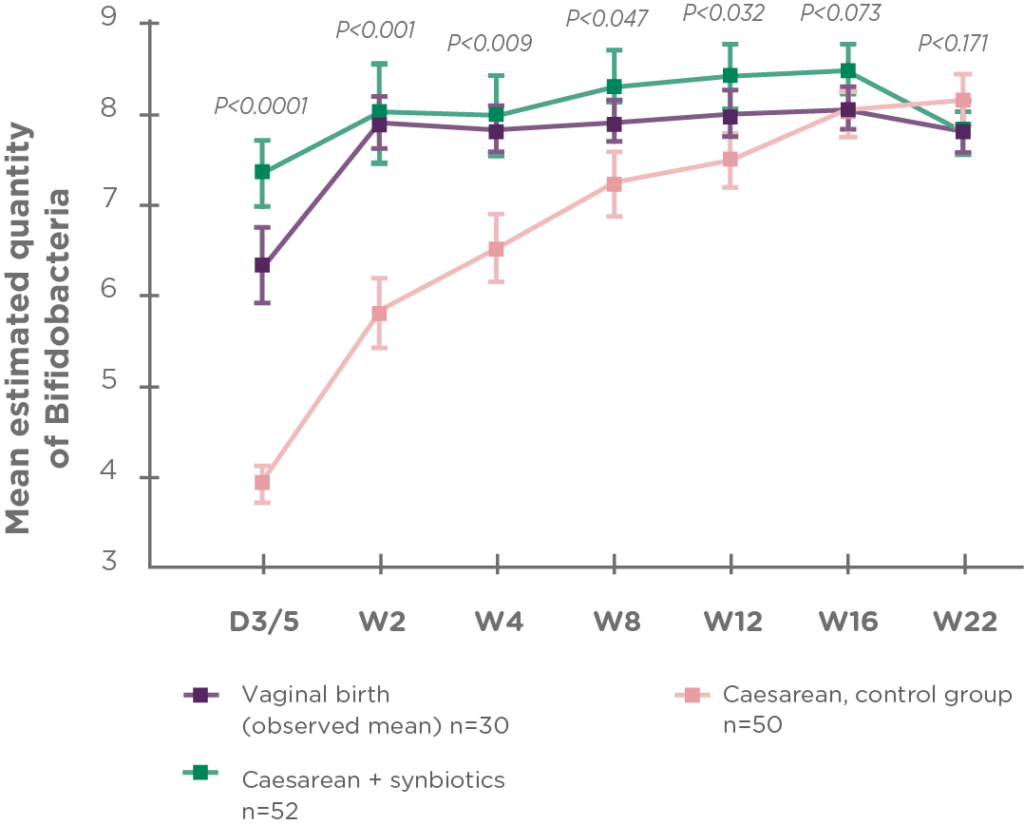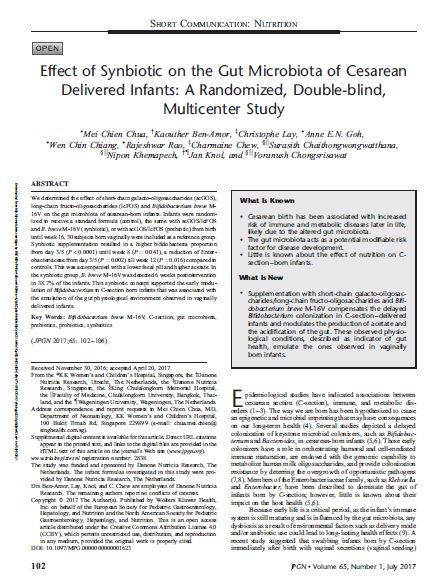Conducted in Singapore and Thailand on 153 infants, the randomized, multicentric, double-blind study of Chua et al. (2017) demonstrates that the use of an infant formula containing a mixture of synbiotic helps restore the weakened gut microbiota of babies born by c-section.
OBJECTIVES AND METHOD OF STUDY
The objective of the study is to evaluate the effects of an infant formula containing a combination of synbiotic on the gut microbiota’s balance of caesarean-born infants. During the study, all the formulas tested were well tolerated.
| Reference Group | Control Group | Prebiotic Group | Synbiotic Group |
|---|---|---|---|
| N=30 | N=50 | N=51 | N=52 |
| Infants born vaginally Non-randomized Breastfed and/or standard formula | Born by c-section Randomized Standard formula | Born by c-section Randomized Formula with prebiotics (0,8g/100 ml scGOS/lcFOS*) | Born by c-section Randomized Formula with synbiotic combination (0,8g/100 ml scGOS/lcFOS* + 7,5×108 ufc/ 100 ml B. breve) |
These different types of feeding (breast milk or infant formulas) have been established from birth to 16 weeks of age. Meanwhile, stool samples were taken on the 3rd day, the 5th day, the 2nd week, the 4th week, the 8th week, the 12th week, the 16th week and the 22nd week.
The following factors were taken into account:
- The total number of fecal Bifidobacteria
- The abundance of Bifidobacteria’s species, and other bacteria of the gut microbiota
- The examination of metabolic activity markers in the gut microbiota ecosystem (fecal pH, short-chain fatty acid levels, lactate)
- Monitoring of safety parameters (anthropometry, gastrointestinal tolerance, various events)
RESULTS

The results reveal a significantly lower amount of Bifidobacteria in the control and prebiotic groups until week 12. However, this amount is restored to a similar level to that of vaginally born infants (reference group) in the synbiotic group from the first days. These results show the benefits of the synergetic effect of synbiotic on the rapid recovery of colonization by Bifidobacteria.
The rapid implantation of this key strain helps to imitate the gut physiological conditions observed in children born vaginally (acetate production and acidification of the gut environment: biological phenomena represented as indicators of good digestive health).
Thus, the study carried out by Chua et al. (2017) demonstrates that infant formulas containing a combination of scGOS/lcFOS* prebiotics and B. breve probiotics compensate for the delayed colonization of Bifidobacteria in caesarean birth, at a similar level as babies born vaginally.

Download the clinical study of Chua et al. (2017) : Effect of Synbiotic on the Gut Microbiota of Caesarean delivered Infants: A Randomized, Double-blind, Multicenter Study.
References
*scGOS/lcFOS = short-chain galacto-oligosaccharides, long-chain fructo-oligosaccharides
- Chua, et al. “Effect of symbiotic on the gut microbiota of cesarean delivered infants: a randomized, double-blind, multicenter study.” Journal of pediatric gastroenterology and nutrition1 (2017): 102-106.
BA20-766
